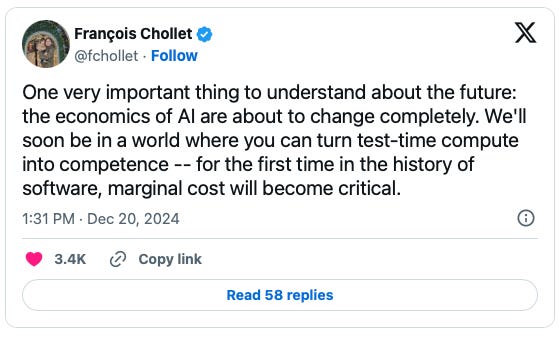40 Acres and a (Digital) Mule
O3 Moves the AGI Goalposts Again | Wishing on an AI Agent for Christmas
👋 Hey, I'm Bryan. Welcome to Code & Context, where we explore how to survive and thrive in the age of artificial intelligence. Through essays, commentary, and AI code experiments, I share insights on AI, culture, and creativity – helping you navigate the future that's already here.
“Because with culture, we can beat the machines.”
Subscribe now to join our community of forward-thinkers shaping our AI-infused future. Get thought-provoking essays, practical AI insights, and early access to tools from Intertwine AI.
My life flows between music, code, teaching, performing, mentoring, and writing. I love how these different roles inform each other, creating unexpected insights and possibilities. Just this past month, I’ve launched Principal Brothers, a new organization celebrating Black excellence in classical music, teed up some big changes for this newsletter, to be revealed in 2025, and unwrapped plans for some fantastic upcoming tours with the Poulenc Trio. It's exactly the kind of creative work I live for.
But lately, the spaces between these passions have filled with noise—that buzz of background tasks that I suspect many of you are feeling too. My calendar looks like a game of Tetris played by someone with a grudge against empty space. And with every new morning, a rush of fresh todos, messages left unread across a myriad of apps, indecisions draining the energy needed to get deep work done. The sweet spots where creativity used to flourish are getting jammed up with busywork, that modern condition that seems to spare no one I know.
This week, after the intense end-of-the-year meetings and deadlines, hacking through thorny programming issues, and dancing the familiar December two-step, between professional demands and personal obligations—a dance many of us do around this time of year—I found myself making a wish list. Not for gadgets or games, but for something far more precious: time. The time we all need to think deeply, create freely, and actually enjoy the work we love instead of drowning in the administrative overhead that surrounds us. In conversations with friends and colleagues, it's the one thing everyone seems to want more of, especially during this hectic holiday season.
What if technology could actually give us this gift of time? Not through another app or productivity tool, but through something more fundamental: intelligent agents that could truly understand and handle the complexity of our daily lives. It's not just a fantasy anymore. From OpenAI's Sam Altman calling AI agents "the next giant breakthrough" to prominent AI researcher Kai-Fu Lee predicting 2025 as their breakthrough year, industry leaders are converging on a vision where digital assistants won't just answer questions—they'll actually get things done for us.
The Promise of a Digital Revolution
The pieces of this future are coming together faster than anyone expected. Just yesterday, OpenAI's O3 model achieved what many thought impossible: solving 87% of the ARC reasoning challenges, tasks so complex that Fields Medal winners predicted they'd resist AI for years. In San Francisco and Silicon Valley, companies are racing to build what these agents will need: voice systems that understand us like humans do, thinking engines that can tackle intricate problems, programs that can use computers as naturally as we do.
I dream of AI agents that could manage not just individual tasks, but the whole intricate dance of a multi-faceted life. Picture a marketplace where these agents work for us: making small decisions, handling purchases, juggling resources. A world where I could focus on growing Intertwine AI, my AI consultancy, while still having time for music and performance without drowning in logistics. As Microsoft CEO Satya Nadella predicted at last week’s 2024 Ignite Conference, our current world of rigid subscriptions and clunky apps could give way to something more natural—a flowing exchange of services and capabilities, managed by our digital helpers.
The Moral Architecture of History
Yet this desire to offload our burdens carries uncomfortable historical resonance. As an African American technologist in these uncertain times, when old promises seem to echo and familiar disappointments loom, I can't help but think of the phrase "40 Acres and a Mule"—one of the most significant unfulfilled promises in American history. In January 1865, Union General William T. Sherman issued Special Field Order No. 15, promising newly freed Black families parcels of land and the means to work it. This wasn't just about property—it was about autonomy, dignity, and the ability to build generational wealth after centuries of forced labor.
The promise was quickly broken. President Andrew Johnson revoked the order, returning most of the land to its former Confederate owners. This reversal became a symbol of how America's systems of power and privilege consistently found ways to maintain inequality, even after moments of apparent progress. For generations, Black Americans continued to toil, often in conditions barely better than slavery, while others reaped the benefits of their labor—a pattern that sometimes feels eerily current.
Today, we face a new inflection point. As AI researcher François Chollet warns, the economics of AI are about to change completely. Unlike traditional software, where the cost of serving one more user is negligible, these new reasoning models get better results by using more computing power at runtime. We're already seeing this play out with OpenAI's Pro subscription tier at $200 per month and rumors of an upcoming $2,000 per month tier for power users. The divide between those who can afford premium AI assistance and those who cannot threatens to become another fault line in our digital society.
For the first time in history, we can imagine lifting the burden of routine work without exploiting other humans. But this possibility forces us to look hard at what we really want. Are we seeking freedom for higher purposes, or just trying to avoid the necessary friction of being human? Some kinds of work—even the boring stuff—help us grow. Scheduling headaches teach us to prioritize. Administrative tangles build problem-solving skills. Even mundane tasks keep us connected to real life. If we hand too much to our digital helpers, do we lose something essential? And if these helpers become a luxury good, do we risk creating new forms of inequality as profound as those of the past?
A New Chapter in Human Agency
I started thinking about "40 Acres and an AI Agent" as a provocative phrase, but it's grown into something deeper: a way to think about power and opportunity in an automated world. The original "40 Acres" wasn't just about compensation—it was about giving people tools for dignity and self-determination. As we build this new world of AI assistance, we face similar questions. Will these powerful digital agents become another luxury for the privileged? Or can we make them tools for everyone to flourish?
Building reliable AI agents is technically hard, but getting the ethics right might be even harder. We need systems that make us more capable without making us less engaged, that make life easier without making us lazy, that serve everyone rather than just a few. As I work to build music programs and mentorship opportunities, I think about how AI could either amplify or diminish our human connections. Will it help us create more meaningful relationships, or will it insert artificial barriers between people?
As the year ends and I watch breakthroughs like O3 redefine what's possible, I remember that every technological revolution can either free us or divide us further. The question isn't just what these AI agents can do, but what kind of world we want to build with them. We have a chance to learn from history instead of repeating it—to create tools that help everyone thrive.
The future isn't arriving in dramatic leaps, but in small steps that add up to something revolutionary: better voice recognition here, smarter reasoning there, gradually weaving into systems that could change how we work and create. As we gather for the holidays, exchanging gifts and sharing moments with loved ones, it feels like the perfect time to imagine a future where technology gives us back what we need most: time for connection, for creativity, for the human moments that make life meaningful. Let the machines handle the scheduling and the spreadsheets—we'll focus on the music, the laughter, the light.





